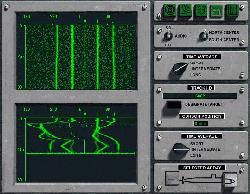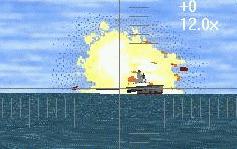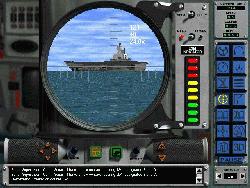Dive! Dive! Dive!
I remember playing Silent Service on the original Nintendo. I had always
wanted to be at the helm of a submarine and Silent Service let me do just
that. Unfortunately, the spell of fantasy was broken by the bad sound, poor graphics
and low realism. It simply wasn’t possibly to build an immersive submarine simulation
for a platform such as the Nintendo.
In designing for Pentium-class
computers, the 688(I) programmers had the freedom to achieve a high level
of realism, graphic and sound quality. For the most part, they used it. 688(I)
is a simulation of the Los Angeles class of submarines. It was even made by
Sonalyst, the same company which creates training simulations for The Navy.
Missions are of four varieties in 688(I). There are training missions,
in which there is no risk to your sub and crew; Single missions, in which you
must accomplish a specific objective; Campaigns, in which you must destroy as
many enemies as possible before you are destroyed or run out of ammunition.
Finally, there are multiplayer missions, in which you and a few of your friends
can play against each other in either co-op or deathmatch. Unfortunately, to
play multiplayer, each player must own a copy of 688(I).
Control of your submarine is managed by a number of
different stations, each of which represents one aspect of the
submarine. In play, you will find that most of your time is
spent at four of these stations: Sonar, TMA, Weapons, and
Navigation.
The Navigation station is probably the most straightforward
of the stations. Navigation consists of a zoomable, pannable map
of the area with the best known positions of all ships in the
area overlaid. It includes an additional screen which displays
the depth beneath the keel, which is useful if you need to make
sure you won’t run aground.
The Weapons station allows you to assign targets to specific
weapons, reload empty torpedo tubes, and check on the number of
weapons in storage. Prior to firing, weapons can by assigned
presets such as depth, activation range, deactivation range(in
case of a miss) and speed. The presets allow the advanced
submarine captain to ensure that weapons will take a route to
their target that delays their detection by enemies, and ensures
that the weapon will not attack friendly or neutral forces.
Countermeasures such as jammers and decoys can also be used if
you come under fire. However, it was at the weapons station that I found
fault with 688(I). Weapons are reloaded much more quickly than
in real life. I don’t know the speed of a crew on a real
submarine, but somehow I suspect that it takes them a little more
then 5 seconds to reload a torpedo tube. There is now a patch available of the net to fix this.
 The Sonar station gives you five
The Sonar station gives you five
functions for identifying other ships in the water. There is active sonar, which
can be set to give a single pulse or periodic pulses. Active intercept tells
you the bearing and relative range of ships in the area using active sonar.
DEMON, which stands for DEMOdulated Noise, can analyze the sound coming from
a ship and tell you its speed. Broadband waterfall shows a cascading display
of the bearing of passive sonar contacts. Finally, Narrowband waterfall can
be used to classify targets so you know if they are friendly or hostile. In
all sonar modes, contacts show up as brighter green pixels against a black or
dark green field of noise.
The TMA station is the most difficult to master. TMA stands for Target Motion
Analysis. The TMA station is where information from all sensors is compiled
to try to give the most accurate picture of a target’s position, speed, and
heading. The reason TMA is so difficult is that it usually involves taking bearing-only
measurements of the target and then trying to estimate its range and speed.
For example, if you first spot a target at bearing 90, and one minute later
you spot it at bearing 91, and the next minute at 92, does this perceived motion
exist because the target is moving North, or is it because you are moving South
faster than the target is? Fortunately for novices, there is an option which
can make the computer handle TMA like an expert.
Graphically, 688(I) is very good. The only blockiness I noticed was
when looking at the ocean or at an explosion at very close range. All craft
are Gouraud shaded and texture-mapped. They also have nice little touches like
spinning propellers and wakes. Sound is also good. The executive officer repeats
your orders to the crew, although he can get a bit repetitive. You can listen
to the white noise of a sonar contact, or feel fear as an enemy’s active sonar
gets louder and louder.
The AI is unexceptional, and as can be seen from the
included mission editor, merely follows a preset tactic. The AI
seemed to show varying degrees of hostility towards me. At
times, it would launch a torpedo as soon as it detected my
presence, while at others, it did nothing even when I fired
torpedoes at it. It seems that no one bothered to teach the AI
the simple tactic of returning fire.
Despite a few realism and pixelation faults, 688(I) is great fun to
play. It’s great for your ego to be in command of a 300 foot long, nuclear-powered
missile carrying Hunter/Killer [Ed. Note: Freud would be so proud.].
688(I) makes it a fun challenge to sneak up on your enemy, attack, and
get away without detection. With over 30 missions, it can keep the average gamer
busy for many hours. And with multiplayer and a mission editor, there is a lot
of play value for your dollar. If you are a fan of submarine sims, or have wanted
to command a nuclear sub without the cramped space and lack of fresh food, then
you should put 688(I) in your sights.

-
Excellent Submarine Sim
-
Good realism
-
Slow pace
-
Weak A.I.







